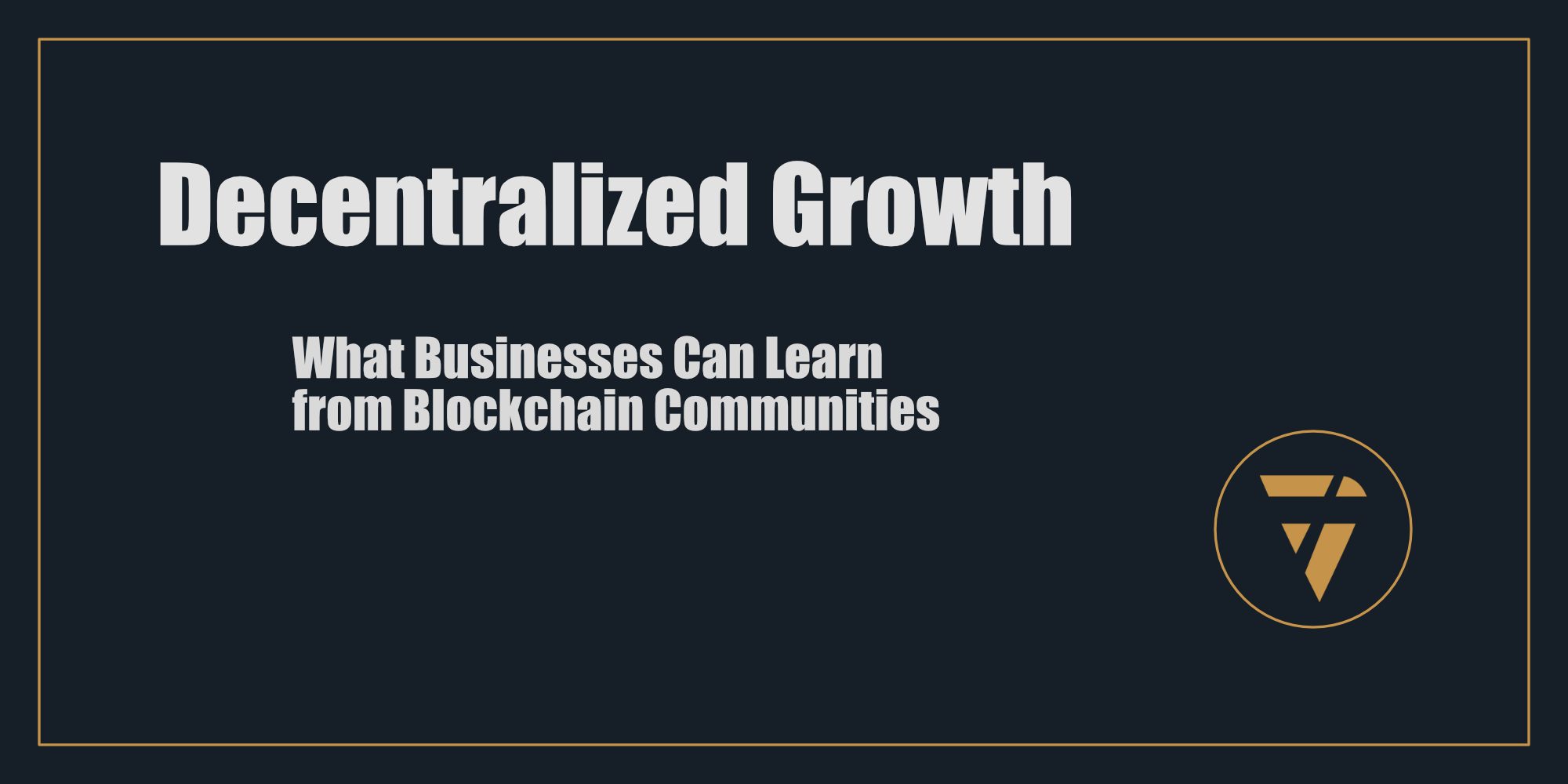Decentralized Growth
What Businesses Can Learn from Blockchain Communities

Decentralization isn’t just a tech trend—it’s a blueprint for a better way to do business.
In 2008, Bitcoin emerged as a decentralized alternative to traditional banking, bypassing central authorities and putting trust into code. Fast forward, and blockchain systems have evolved into more than just financial tools—they’ve become a model for collaboration, profit-sharing, and innovation.
At the heart of this movement is a revolutionary idea: you don’t need a central authority to build trust, distribute value, or make decisions. Transparency, shared governance, and autonomy are no longer aspirational—they’re the operating principles of the future.
But what does this mean for your business?
* fun Bitcoin story! A colleague and business partner suggested we both put $15k into these new token miner things, in 2008. We both created a wallet… and then invested in another business that was the right decision at the time. I have never done the math to see what I missed. :)
What is Decentralization, and Why Should You Care?
Decentralization shifts power from the few to the many. It replaces opaque hierarchies with transparent systems, enabling collaboration on a scale that traditional models can’t match.
The core principles:
- Transparency: Everyone sees the rules, and no one can cheat the system.
- Shared Governance: Decisions are made collectively, not dictated from the top.
- Equitable Value Sharing: Profits flow to all contributors, not just shareholders.
This isn’t just a blockchain story—it’s a mindset. And it’s challenging businesses to rethink how they operate.
Lessons from Decentralized Communities
- Trust Without Intermediaries
Blockchain technologies like Ethereum create trust through transparency. Every transaction is visible, verifiable, and immutable. Imagine applying that principle to supply chains—your customers and partners could track every product from source to shelf, building confidence in your brand. - Shared Governance Through DAOs
Decentralized Autonomous Organizations (DAOs) give stakeholders voting power on decisions, fostering loyalty and engagement. What if your employees or customers had a real voice in shaping your business strategy? - Equitable Value Distribution
Tokenomics allows contributors—whether developers, early adopters, or customers—to share in the financial success of a project. Think about turning your loyalty program into an equity-sharing initiative. Customers wouldn’t just buy from you; they’d root for your success.
These aren’t hypothetical ideas. Companies like Unilever are using blockchain to track sustainable sourcing, while startups like Axie Infinity are turning users into stakeholders through tokenized ecosystems.
What This Means for Traditional Businesses
Decentralization isn’t about abandoning structure—it’s about evolving it. It’s not just for tech disruptors or crypto enthusiasts. The principles of transparency, shared value, and collaboration apply across every industry.
Practical Applications:
- Supply Chain Transparency: Build trust by showing where every ingredient, material, or component comes from.
- Shared Governance: Create advisory councils where employees and customers collaborate on decisions.
- Profit Sharing: Develop token-based rewards systems that let contributors benefit from your growth.
Challenges to Overcome
Decentralization isn’t without hurdles:
- Cultural Resistance: Traditional businesses are slow to adapt to models that challenge entrenched hierarchies.
- Regulatory Uncertainty: The legal landscape for decentralized models is still evolving.
- Technological Complexity: Implementing blockchain and decentralized tools requires expertise.
But these challenges aren’t insurmountable. They’re invitations to innovate.
The Proconsul Perspective
At Proconsul, we believe decentralization aligns perfectly with the principles of “Common Wealth.” It’s about more than technology—it’s about distributing power, fostering trust, and creating systems where everyone has a stake in success.
Businesses that embrace these principles don’t just survive—they thrive, building loyalty, driving innovation, and outperforming competitors who cling to outdated models.
Actionable Steps to Decentralize Your Business
- Audit Your Operations: Identify areas where transparency and shared decision-making could build trust and engagement.
- Experiment with Hybrid Models: Combine centralized leadership with decentralized tools like blockchain for specific processes.
- Empower Your Stakeholders: Create mechanisms for employees, customers, or partners to participate meaningfully in decisions.
- Learn from Decentralized Communities: Study DAOs, blockchain platforms, and tokenized ecosystems to adapt their principles to your context.
The Future is Decentralized—Are You Ready?
Decentralization isn’t just about tech—it’s a new mindset for business. It challenges you to think beyond profit to purpose, beyond control to collaboration.
So here’s the question: What would your business look like if trust wasn’t enforced but embedded? If value wasn’t extracted but shared? If decisions weren’t dictated but made collectively?
This isn’t just a trend. It’s a transformation. And the businesses bold enough to embrace it will lead the next era of growth.
Let’s explore this together. Share your thoughts in the comments, or schedule a consultation to learn how Proconsul can help you apply decentralized principles to unlock your next wave of innovation.
This Substack is reader-supported. To receive new posts and support my work, consider becoming a free or paid subscriber.
This is what I’m working on. Tell me what you think, I enjoy the conversation! Subscribe and follow the work in real time.
Thanks!
B
Decentralization isn’t just tech, it’s a mindset. Transparency, shared value, and autonomy are reshaping how we work. How can your business adapt?
PS -





